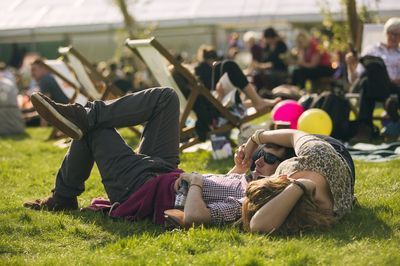A weekend at Hay
By TOBY LICHTIG
The sun came out for
the final weekend of this year's Hay Festival, the surrounding hillsides, well
nourished by recent downpours, almost impossibly lush amid the dazzle.
Fertile as ever was the programme, the recent spat over apparent snubs and
prejudices looking increasingly like a breeze in a Fleet Street
teacup. The marquees were full, the deckchairs out, the punters looked
delighted.
Navigating the packed programme is always a challenge. Our first stop on Friday evening was to
see the TLS Classics editor Mary Beard, who spoke about her recently published
collection of reviews and essays, Confronting the Classics, and the
significance of the verb in the book's title (“there's no point in being deferential
and reverent”).
This was probably the
noisiest audience of the weekend, and Beard received a rapturous reception, not
least when one member stood up to thank her for her services to feminism and
recent attack on internet trolling. Returning to the main subject, Beard spoke about why Classics is still “relevant” (it's “so embedded in
Western culture that you cannot remove it without leaving a bleeding
torso”), while reminding us that this state of affairs is also a matter of happenstance: “Dante
didn't read Gilgamesh; he read Virgil . . . . But if the
Persians had won the Persian war we'd be in a different place.” Speaking
about her recent television series, Meet the Romans, Beard artfully let slip
that she's working on another television project, about Caligula. “No one is
to tweet this”, she cautioned, as 1,000 mobile phones pinged into life.
On Saturday morning,
Simon Hoggart gave a wonderfully commanding performance about the past thirty
years of parliamentary life. Part lecture, part stand up comedy, his routine focused largely on the sanity of Margaret Thatcher, a subject about
which Hoggart appeared to be in little doubt: “She was completely and
utterly bonkers”. The sketch writer then trotted out a few – it must be
said – rather hackneyed anecdotes about the former Prime Minister's sense of
humour, including the story about how a line from Monty Python's “dead
parrot” routine ended up in one of her speeches in which she poked fun at the Liberal Democrat "bird of liberty" logo. Failing to get the joke
about the symbol – “this is an ex-parrot” – Thatcher was first shown the sketch by her writers. She is said to have remained “absolutely
stony faced”, later asking, “This Monty Python. Are you sure he's one
of us?”
Similarly commanding
and entertaining – though rather more serious in terms of content – was Jay
Rayner, who delivered a performance lecture, complete with graphs, graphics and
a conversation with himself, about the current state of the global food
industry. Rayner's basic thesis, explored at greater length in his recent book,
A Greedy Man in a Hungry World (to be reviewed in a future edition of the TLS),
is that the current vogue for locally sourced produce, organic fare and farmer's markets is little more than a middle-class fad which
will do nothing to solve the encroaching food crisis. Rayner argued persuasively that food miles account for a
tiny proportion of a product's carbon footprint and reminded us that we've been
genetically modifying what we eat for centuries. "We're supposed to favour the
artisanal over the industrial", he said; but what we actually need to do is produce
more, grow and distribute it more efficiently, and cut down on land-intensive
food such as beef, rather than simply buying nicely-packaged versions of the
stuff. Rayner argued for "sustainable intensification" and a
necessary hike in some food prices, to stop farmers allowing their fields to
lie fallow (one particularly tragic case involved a recent British plum harvest
left to rot after farmers were undercut by imports). "Unless we pay more
for our food now, we'll have to pay vastly more later", said Rayner.
Food was also on the
mind of the journalist and China commentator Jonathan Fenby, who spoke about
the "certainty" of a food crisis in China, after the false economy of several years of
good harvests. In a deeply absorbing session, Fenby confronted numerous other
problems facing the country, including those caused by its growing,
disenfranchised migrant worker population, its political corruption, creaking
judiciary, an unaccountable "shadow" banking system, and a set of
vast and essentially "frozen" dollar reserves. These factors – and
more – contribute to Fenby's belief that China is unlikely to
"dominate" the twenty-first century.
Today's literary
climate demands that successful authors must also be captivating speakers. This does
not, inevitably, suit everyone. The highlights of the weekend were notable for their
oratorical excellence and feats of presentation; other events fell rather more
flat. Peter Sawyer, whose The Wealth of Anglo-Saxon England is reviewed in this
week's TLS, while charming and full of insight, didn’t quite make the
distinction between an academic lecture and a literary event; a talk about
teenage runaways was filled with poignant and memorable stories but otherwise
lacked substance; Rose Tremain and John Mullan made an excellent double act –
both witty and confident speakers – but their discussion of historical fiction
could have benefitted from greater literary context. Some interviewers were more inventive in their interrogations than others. Audience questions were generally apposite. The food was
varied, excellent and expensive. The bookshop was selling out. Hay, whatever
the recent imbroglio, appears to be in rude health.
Peter Stothard's Blog
- Peter Stothard's profile
- 30 followers




